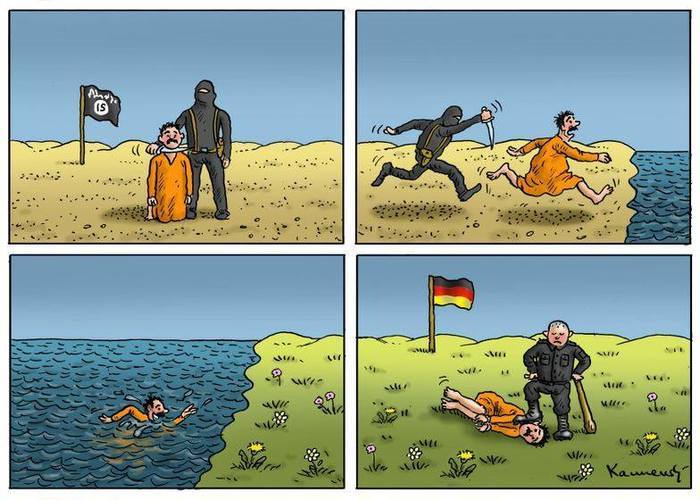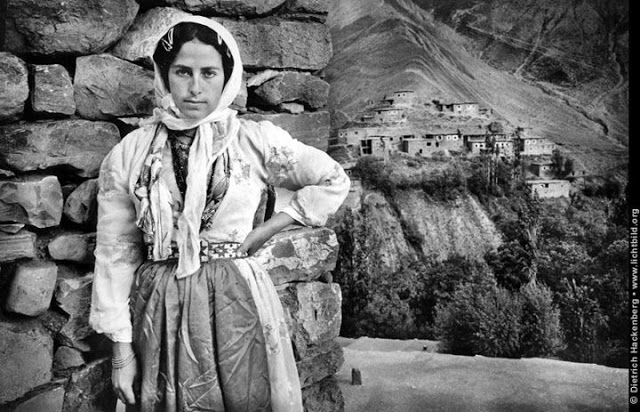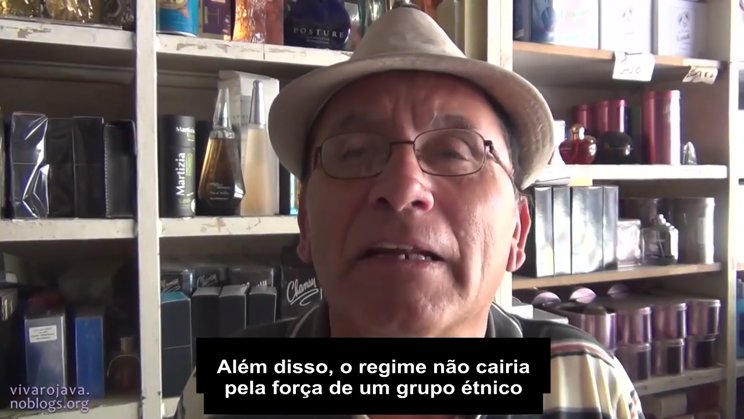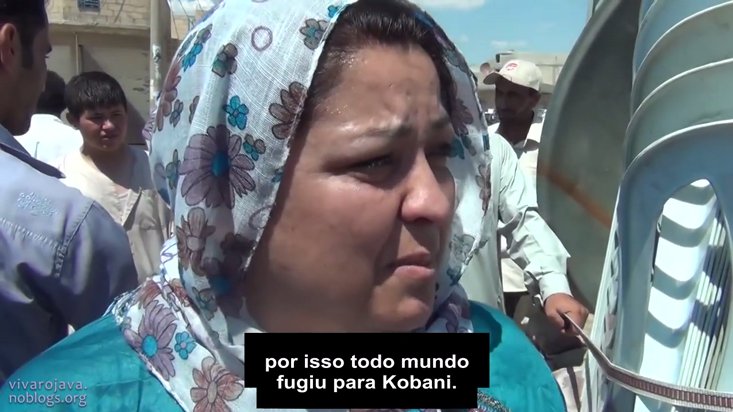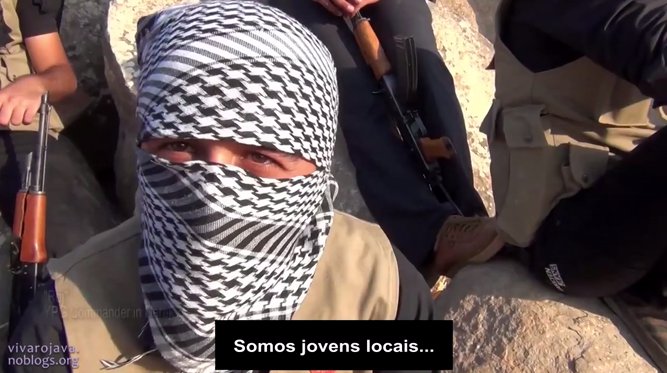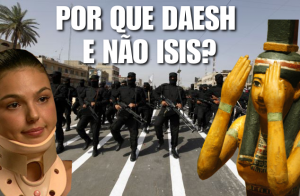Dois textos, em inglês.
ISIS economy and importance of Rojava
NEWS DESK – The following article “IŞİD ekonomisi” was written by Metin Yeğin and appeared in Özgür Gündem. It has been translated into English below.
“The extent of ISIS economic activities functioning around booty often goes unnoticed and it is evaluated as simply the distribution of spoils captured in war according to Islamic practices!
For example when ISIS sold the Yezidi people which they captured – the men as slaves and the women as concubines – because Yezidism was a ‘non-sanctioned’ religion and this came onto the world’s agenda, its human dimension shocked the world. When a simulated slave market was set up in the streets of London, complete with simulated veiled concubines, it was perhaps the first time since the bombing of the Nazi army in the Second World War that the British public was unified in its support for a bombing campaign.
However it is forgotten that behind this ‘human’ aspect lies an ‘ordinary’ economy that works to reproduced everyday life. That is to say that ISIS is not an organization only concerned, as the public might imagine, with the ‘other world’ or ‘paradise.’ In the first place the situation which emerged following the intervention in the Gulf and the occupation of Iraq created a sphere of “obligatory” economic activity for different groups. The large bureaucratic apparatus, the army and the security forces on which the Saddam government – like every authoritarian regime – depended on was left in a bind following the destruction of the regime. These groups were particularly excluded by the new, heavily Shia Iraqi regime and nothing remained in the hands of Sunni communities.
The lion’s share of the income from oil, the country’s most important resource, was taken by international oil companies, and what was left was divided up by those close to the occupiers, the Kurdish governments of Barzani and Talabani and Shia powers each in proportion to their influence. Nothing remained in the hands of the Sunnis. At the same time the agriculture which had sustained the lands of Iraq for thousands of years was destroyed in the course of the occupation. The agricultural economy which relied on the annual cycle collapsed. In particular the Sunni people of Iraq, who could no longer practice agriculture, lost their basic form of economic activity which had served as their livelihood for thousands of years, and even worse they could no longer produce enough food to fill their stomachs.
The only thing which remained to them, even if backwards, was the “war economy.” The income from this economy does not only derive from the sale of members of religious communities liked the Yezidis deemed to be forbidden by those above. It is an integral sphere of economic activity characterized by the ransom of kidnapped Christians, concubines, slaves, gold, money, the management of conquered property and the the rent derived therefrom, and the 20% tax paid on all of this income to the ‘Islamic State.’ This situation has once again proved the old adage, often used in these parts, that “the grass doesn’t grow where the soldier trods.” After the occupation nothing remained except the retrograde economy of pillage.
Moreover employment and unemployment – as is the case everywhere – are not only a questions of income but of social status. The Sunni community did not just lose their income but their social status. The former members of the bureaucracy, the soldiers, security services, and tribes have replaced their former positions and social status, now destroyed, with the terrible explosions of truck bombs, the esteem of territory captured for Islam, and of course the status of the martyr.
The concept of martyrdom – poorly understood in the West – is in fact nothing other than what comes from the dynamic derived from “the beautiful days to come” that occupies a place in every social structure’s utopic foundation. Once more martyrdom is not a status which only exists for the dead in the other world, but comes to define the social status of his or her family and tribe in this world. The real prize of the family or tribe of the martyr, outside of the small share which falls to it from the war economy, is its standing and even if perhaps impoverished it comes to posses a status and prestige which allows it to “walk around with its head high.”
It is not at all difficult for a social structure – particularly one subjected to massacre at the level of Fallujah or the experience of torture such as occurred at Abu Ghraib – to be terrorized by ISIS’s economy of plunder in the form of an Islamic ideology.
For that reason the economy of “communes, collectives and cooperatives” symbolized in Kobanê and Rojava is so important for the Middle East.
Either radical democracy or barbarism…”
September 21, 2014 7:18 pm
Fuelling Isis Inc
Waiting for his job interview, the young Syrian was impressed by the array of high-end camera equipment, video-editing pods and overall organisation in the offices of his prospective employer. The salary, five times that of a typical Syrian civil servant, was not bad either.
“They offered me $1,500 a month, plus a car, a house and all the cameras I needed,” says the one-time tailor in his late 20s. “I remembered looking around the office. It was amazing the equipment they had in there. I remember thinking, these people can’t just be getting their money on their own. There has to be a state behind this.”
He chose not to take the job – staying in Syria was too dangerous, he decided – but the story illustrates the level of resources and funding available to the terror group that has grown out of the Syrian conflict into an organisation that President Barack Obama committed the US to “degrade and ultimately destroy” this month.
Strangling the source of that revenue – which estimates put at anywhere between $1m and $5m a day – is seen by the US and its allies as essential to halting the Isis advance.
10
The number of oil fields under Isis control in Syria and Iraq
Western investigators have sought to trace bank account numbers in the Gulf and locate jihadi donors as far afield as Indonesia. In addition to nefarious ransom and extortion rings, Isis taps areas under its control for money, charging retail stores about $2 a month in taxes. In coming days, it plans to charge for electricity and water consumption to make money in areas under its control, according to one activist in Syria.
But experts say that to crack down on Isis’s finances, western governments and their Middle East allies must look first at a decades-old oil smuggling network, which is now being tapped by the group to finance its proto-state. This lucrative unofficial trade encompasses northern Iraq, northeastern Syria, southern Turkey, parts of Iran and, according to western officials and leading international experts, is where Isis earns the bulk of its money.
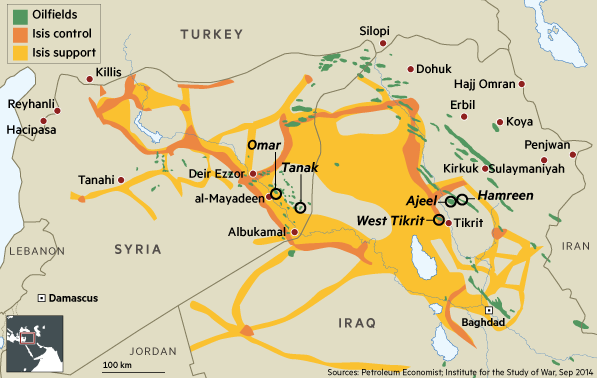
Maplecroft, the risk management firm, says in a recent report that Isis now controls six out of 10 of Syria’s oilfields, including the big Omar facility, and at least four small fields in Iraq, including those at Ajeel and Hamreen.
Oil smuggling has deep roots in the region. After the imposition of UN energy sanctions on Iraq in the 1990s, a robust network of smugglers, traders and bootleg refineries have flourished.
171
Iraq’s ranking in Transparency International’s corruption index
Hundreds of entrepreneurs emerged, buying and selling small parcels of Iraq’s oil at discounted prices and transporting them across the Turkish border to sell at a markdown. Many of the business people have grown rich and powerful, with vested interests and political ties.
Energy experts and western officials say Isis may be laundering up to 80,000 barrels of oil a day worth several million dollars through this shadow market. The oil is smuggled through rugged mountain and desert routes or even legitimate crossings at Reyhanli, Zakho or Penjwan for consumption in Turkey, Iran or Jordan.
“The fact that Iraq was under sanctions for so long led Kurdish and Iraqi businessmen to fill a vacuum and create smuggling networks for Iraqi oil,” says Valerie Marcel, a Middle East and Africa energy specialist at Chatham House, the London think-tank. “Turkish, Iranian, Syrian, Iraqi networks have grown because of decades of bans on exports. From Iraq and now from Syria there is this grey market. That’s becoming a huge problem.”

Black market oil is often refined at plants in Iraqi Kurdistan that are partly the byproduct of the tensions between Kurdish leaders and Baghdad. In recent years the Kurdistan Regional Government looked the other way as homegrown refineries popped up to supply the local market after Baghdad banned the export of petroleum products without its consent.
This means that the Kurds are potentially helping put money in the coffers of the jihadi group that its own peshmerga forces are fighting. “It’s now possible that Isis could be selling crude [via middlemen] to these knock-off refineries,” says Bilal Wahab, an energy expert at the American University of Sulaymaniyah. “The KRG is unwilling to shut them down because it would have to raise the price of gasoline. It can’t raise the price of gasoline because it can’t pay salaries, and it can’t pay salaries because the central government hasn’t given the KRG its budget in eight months. Yes, it’s illegal. Yes, it’s bad. But it is what greases the wheels of the economy.”
It is pumping oil and selling it to fundits brutal tactics, alongwith kidnappings, theft and extortion
– John Kerry, US secretary of state
International officials accept that the bulk of Isis’s funds are raised within the vast areas of Iraq and Syria it controls.
“It’s pumping oil and selling it to fund its brutal tactics, along with kidnappings, theft, extortion and external support,” John Kerry, US secretary of state said last week. Asked if the administration was looking at bombing oilfields or refineries controlled by Isis, Mr Kerry said: “I have not heard any objection.”
The boundaries of the mostly Kurdish black market zone have never been easy to police, rarely recognised by people with cross-border kinship and trade ties. The terrain ranges from the grassy plains dividing Turkey from northwest Syria to the forbidding mountains between Iraqi Kurdistan and its Turkish and Iranian neighbours to the flatlands along Iraq and Syria’s Jordanian borders.

Smuggling underpins the economy of the semi-autonomous, three-province KRG with smugglers’ coves dotting its borders with Iran, Syria and Turkey. In towns like Hajj Omran along the Iran-Iraq border smugglers openly regale visitors with tales of their exploits.
Iraqi Kurdistan officials warn they have limited resources to police the trade – it now shares a 1,000km border with Isis – and complain that funds have shrunk since Baghdad began withholding budget revenues to the region, another example of how Iraq’s political divisions benefit Isis.
“The government is doing all it can to control the borders,” says Sherko Jawdat Mustafa, a member of the Kurdistan region’s parliament. “But recession is prevailing over Kurdistan with all its institutions and apparatus.”
Officials also suspect border guards in Iraq, Iran, Syria and Turkey are bribed to allow shipments to pass. “It’s like a drug cartel and a criminal organisation which is also benefiting from official support or [those in power] turning a blind eye,” says Ms Marcel. “It couldn’t exist on the scale that it is right now without some army and customs people being complicit and benefiting.”
Oil fund
The Islamist group now controls 10 oilfields including the big Omar facility in Syria and those at Ajeel and Hamreen in Iraq
Iraq ranks 171 out of 177 in Transparency International’s 2013 ratings of perceived official corruption. Security forces often look the other way in exchange for a cash payment.
“A lot of money also goes to the guys at the checkpoints,” says Mr Wahab. “So you have to enforce accountability at the checkpoints and find ways to keep them from taking bribes.”
A Turkish official recently said seizures of smuggled fuel had risen from 35,260 tons in 2011 to more than 50,000 tons in the first six months of 2014 alone, suggesting an explosion in the trade. But the market appears to have shifted in recent weeks in response to a tightening of Turkish border controls.
Self sufficient
Isis charges stores $2 per month in taxes and is set to introduce electricity and water charges
Much of the trade is carried out inside Isis-controlled areas, making efforts to curb it even tougher. “Now most of the traders are Iraqi,” says Othman al-Sultan, an activist in the Syrian city of Deir Ezzor. “All the Iraqi traders come to buy the crude and take it back into Iraq. Syrian crude is cheap and they use it for generators and factories in Iraq.”
Isis has sought to divorce itself from dependence on international donors in its efforts to create a self-sufficient economy since establishing itself as a significant presence in the Syria conflict. It was in part a disagreement over whether to raise funds locally or internationally that led to friction with other Syrian rebel groups, including the al-Qaeda-affiliated Jabhat al Nusra.
Analysts suggest tracking down account numbers or arresting international supporters will do little to damage the finances of a group that deals almost exclusively in cash. Most Gulf supporters seeking the removal of Bashar al-Assad, the Syrian president, are now largely shunning the group.
“Given that the Islamic State has sought to minimise its reliance on the international banking system, the group is comparatively less prone to asset seizures or international financial sanctions,” says the Maplecroft report.
Big earner
Analysts believe oil represents the single biggest income stream for Isis with the bulk of raised inside its area of control
In addition, the group is believed to have distributed its money across a wide geographic area. “Stopping smuggling operations will not affect the Islamic State in the short run,” says Hisham Hashemi, an authority on Sunni insurgents in Baghdad. “They have enough money – in cash – that could keep them going for a good two years.”
But Isis’s outsized ambition and refusal to compromise might lead to the downfall of its financial empire. Isis’s pretensions toward statehood have compelled it to attempt to take control of the entire process and cut out the middlemen. There are also signs that international momentum is building to stifle the black market oil trade. The governments of Turkey and Iraqi Kurdistan have announced fresh interdiction efforts. Prices of crude oil in Syria have risen from $25 to $41, suggesting decreased production following Turkey’s clampdown on the border, an activist says.
At the smuggling village of Hacipasa, near the Syrian border, residents recently railed at government efforts to block illegal border crossings that provide a livelihood for many Turks. If the recently installed Baghdad government of prime minister Haider al-Abadi resumes long-delayed budget payments to Kurdistan, it would create even more of an incentive for Kurds to crack down on bootleg refineries that purchase black-market oil.
“Isis is trying to take the oil products as close to the end user as possible to capture more profit,” says Ms Marcel. “By doing that, Isis’s finances become probably easier to target than a constellation of little middlemen with small volumes crawling around the whole territory.”
| Supply chain: Industry on alert to spot rogue oil | |
|---|---|
| The quantities are small but the risks are large for any global trader found to be handling oil from Isis-controlled fields, writes Anjli Raval in London.
The biggest traders say they are confident they have avoided purchases of any smuggled oil because of the procedures – counter parties have to pass through strict due diligence and other “know your customer” processes – already in place. As a result low volumes of poor-quality, unauthenticated crude are unlikely to make it into their networks, they say. Analysts, however, warn there is a small chance that oil smuggled out of Iraq by truck could enter the global supply chain. Once extracted it can be easily mixed and processed with oil from legitimate sources, disguising its origin, and making it more difficult for traders to identify its source. Shwan Zulal, an Iraqi oil analyst, says the volumes of Isis oil that could enter the international markets are minimal. But he adds that it is possible for trucked crude to be mixed with pipeline oil in storage facilities at the Turkish port of Ceyhan. “Nobody wants to get involved in this stuff, but this is really the only way [traders] could inadvertently be buying Isis crude,” says Mr Zulal. After Isis’s June takeover of much of northwestern Iraq the UN Security Council warned that those caught trading crude from regions controlled by the group could face sanctions. This could affect bank credit lines. Richard Mallinson, geopolitical analyst at Energy Aspects, a consultancy in London, says: “The Kurdistan Regional Government and operators in the region want their oil to be credible. There is little advantage gained through the smuggling and selling of Isis oil. “What is more likely, is crude via these small refining units being sold within the region to domestic buyers,” he says. “It is much easier to see the end users being located in these areas rather than the oil getting into the international markets in any real way.” Even so the industry is on alert, says Stéphane Graber, general secretary of the Geneva Trading & Shipping Association. “We are following the situation with our members very closely to ensure [they are] not breaking any existing international rules.” |
Additional reporting by Piotr Zalewski in Ankara, Geoff Dyer in Washington and Lobna Monieb in Cairo

